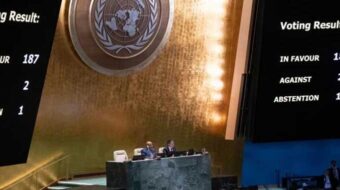Truth is indeed oxygen to the movement for working people’s rights. Reiterating the truth of U.S. terror directed at popular struggle in Latin America is always relevant, despite major problems of war and economic crisis which occupy our attention.
U.S. complicity in terrorist crimes is clear in the case of Cuba. Cuban TV has been broadcasting the new documentary “Cuba’s Reasons: The Route of Terror” which nails down basic facts regarding terrorist Luis Posada Carriles and anti-Cuba terror over several decades. The film briefly examines the Miami-based Cuban American National Foundation (CANF), paymaster of terrorist attacks, and Miami’s Cuban-American politicians, who protect terrorists. The focus, however, is on Francisco Chavez Abarca, who Machetera identifies as “Luis Posada Carriles’ errand boy [who has been] singing like a bird to Cuban authorities.”
Venezuelan officials arrested Salvadoran Chavez Abarca on July 1 as he entered the country. He was immediately extradited to Cuba. In two televised segments, he reports on crimes carried out for over a decade.
A leader of El Salvador’s right-wing Arena Party introduced Chavez Abarca to Posada in the mid 1990s. Posada is the former CIA-deputized Venezuelan intelligence honcho who 34 years ago arranged for the mid-air bombing of a Cuban airliner and killing of 73 people. He ran drugs for the CIA in the U.S. Contra war in Nicaragua in the 1980s. He briefly went to jail for plotting a bomb attack in Panama in 2000 against Cuban President Fidel Castro.
Chavez Abarca said Posada trained him in explosives and had him recruit and train other Salvadorans and two Guatemalans. Chavez Abarca joined them in bombing Cuban hotels and entertainment sites during the 1997 tourist season. On September 4, 1997, bombs placed by Salvadoran Raul Ernesto Cruz Leon exploded in three hotels. The Copacabana blast killed Italian citizen Fabio di Celmo.
Chavez Abarca claimed that Posada paid $2,000 for each bomb placed, that Posada communicated regularly with the CIA and CANF, and that Posada asked him to kill Cruz Leon’s family after the latter confessed to Cuban prosecutors. Chavez Abarca said he came to Venezuela to join destabilization efforts there prior to the recent National Assembly elections. He indicated he had earlier plotted with Posada and right-wing Venezuelans to kill President Chavez and to bomb tankers carrying Venezuelan oil to Cuba.
Police say Chavez Abarca was associated with Alejandro Peña Esclusa, jailed since July when Venezuelan police found him with 900 kilograms of C-4 explosives. Peña heads the UnoAmerica group, involved last year with a foiled assassination plot against Bolivian President Evo Morales. UnoAmerica boasts of ties with leaders of last year’s Honduran coup and El Salvador’s Arena Party.
Terrorist plotters fleeing Venezuela are welcomed in Miami. They include Pedro Lander, Johán Peña, and brothers Otoniel and Rolando Guevara, all implicated in the 2004 bomb attack that killed Venezuelan prosecutor Danilo Anderson. Posada’s former intelligence colleagues in Venezuela are there, notably General Ernesto González who kidnapped President Chavez in 2002, and torture expert Joaquín Chaffardet. Raul Diaz arrived on September 5 after escaping from a Venezuelan jail. He joins partners José Colina and German Varela. In 2003, the trio had tried to bomb foreign embassies in order to create havoc.
Luis Posada Carriles lives in Miami with family members. His court proceedings on immigration charges have been delayed repeatedly. The U.S. government has yet to act on any Venezuelan extradition requests for these individuals.
The story by former car thief Chavez Abarca adds to the mounting evidence that the U.S. government has been exporting terror to Cuba, Venezuela, Honduras and Bolivia.
Speaking to students on September 30, Cuban National Assembly President Ricardo Alarcon dedicated his commemoration speech, which honored martyrs belonging to the revolutionary 1930’s University Student Federation, to Cuban Five prisoners Gerardo, Ramón, Antonio, Fernando, and René. Alarcon’s remarks resonate with like minded activists determined no longer to soft pedal terrorist crimes. The dedication was “for each and every one of us, to save our lives and our right to live in peace.” We will do it the way “we have always done, fighting, fighting for truth.”
One more truth is relevant. The targeted countries are always those where governments in power are dedicated to the interests, well being, and advancement of working and disadvantaged people. For the U.S. empire, anything goes, terrorism included, in its attempt to halt emancipatory processes.

MOST POPULAR TODAY

Zionist organizations leading campaign to stop ceasefire resolutions in D.C. area

High Court essentially bans demonstrations, freedom of assembly in Deep South

Communist Karol Cariola elected president of Chile’s legislature

U.S. imperialism’s ‘ironclad’ support for Israel increases fascist danger at home







Comments